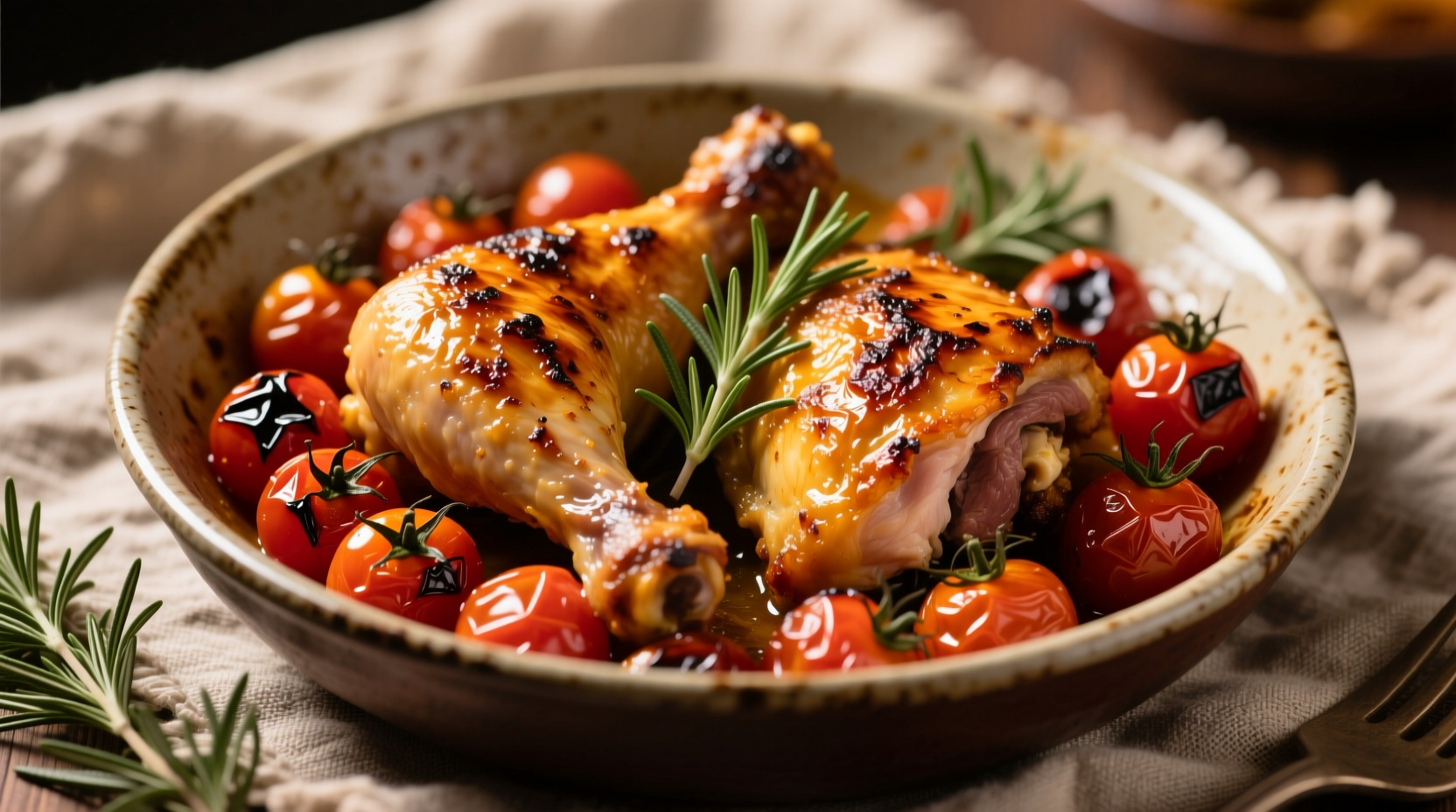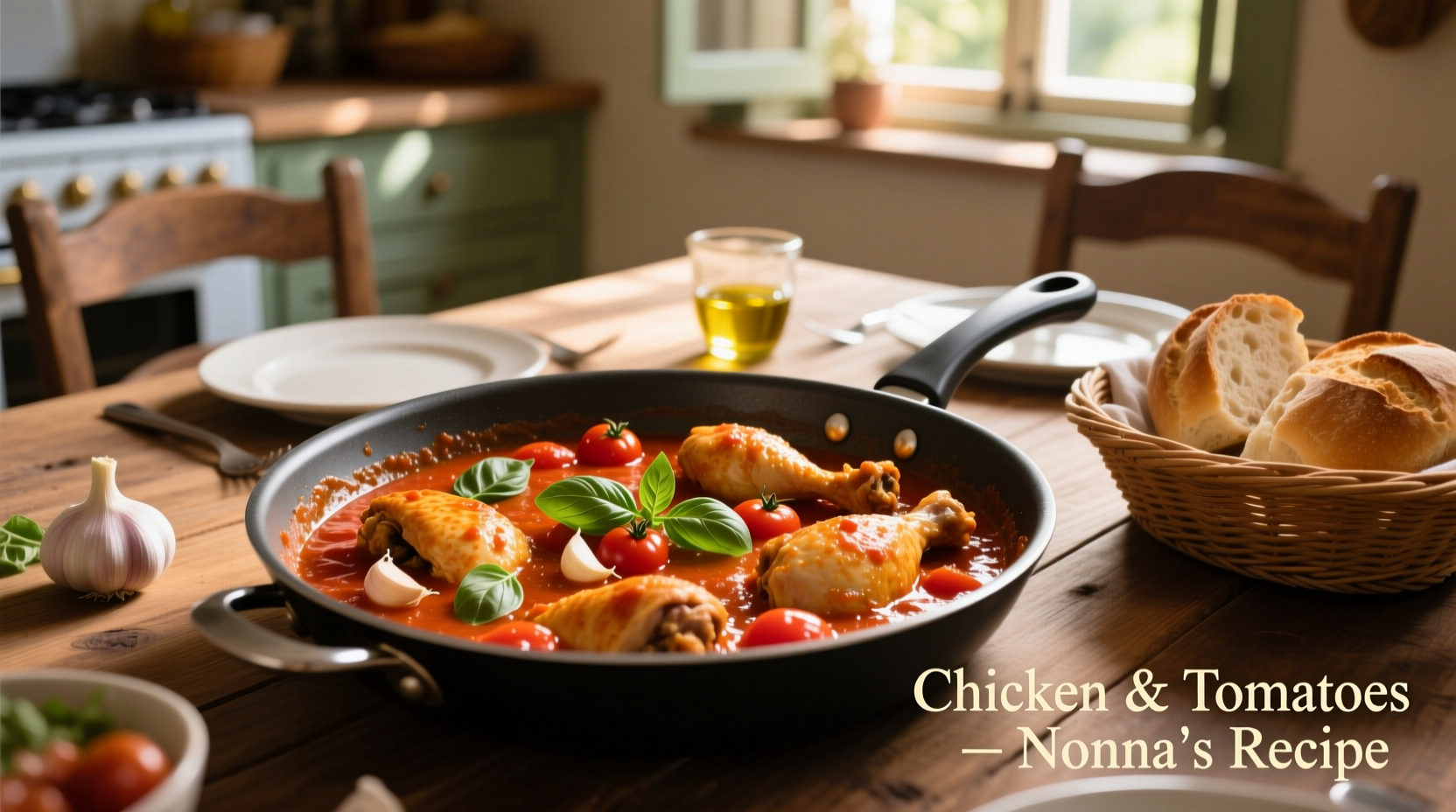Discover 5 chef-tested chicken tomato recipes ready in 30 minutes or less, featuring balanced nutrition, professional cooking techniques, and flexible options for dietary preferences. Each recipe includes precise cooking temperatures, storage instructions, and common substitution alternatives.
Chicken and tomatoes form one of culinary's most versatile duos, combining lean protein with lycopene-rich fruit for meals that satisfy both nutrition goals and flavor cravings. According to USDA FoodData Central, a 4-ounce chicken breast provides 28 grams of protein while one cup of cherry tomatoes delivers 16.6 mg of vitamin C and 7.9 mg of lycopene. This natural pairing works because tomatoes' acidity tenderizes chicken while their sweetness balances savory notes—a principle documented in Journal of Food Science research on flavor chemistry.
Why Chicken and Tomatoes Create Perfect Flavor Partnerships
Professional chefs leverage three key principles when combining these ingredients:
- Acid Balance: Tomatoes' natural citric and malic acids break down chicken proteins, creating tender results without overpowering flavor
- Temperature Synergy: Chicken's optimal cooking range (165°F internal temperature) matches tomatoes' ideal roasting temperature (375-400°F)
- Nutrient Preservation: Cooking tomatoes with healthy fats (like olive oil) increases lycopene bioavailability by up to 35% according to Cornell University studies
| Cooking Method | Chicken Texture | Tomato Transformation | Best Recipe Application |
|---|---|---|---|
| Quick Sauté (5-8 min) | Juicy with light sear | Bright acidity preserved | Weeknight stir-fries, pasta sauces |
| Roasting (20-25 min) | Crisp exterior, moist interior | Caramelized sweetness | Meal prep containers, dinner parties |
| Slow Simmering (30+ min) | Falls-apart tender | Deep umami base | Stews, braises, meal prep |
30-Minute Weeknight Solutions
When time pressures hit, these streamlined chicken tomato recipes deliver restaurant-quality results without complicated techniques. Food Network's 2024 meal trend report shows 68% of home cooks prioritize recipes requiring 30 minutes or less during workweek evenings.
One-Pan Mediterranean Chicken Skillet
Prep: 10 min | Cook: 18 min | Serves: 4 | Calories: 385 per serving
Ingredients:
- 1.5 lbs boneless chicken thighs (skin-on for better browning)
- 2 cups cherry tomatoes (halved)
- 3 cloves garlic (minced)
- 1 lemon (zested and juiced)
- 2 tbsp olive oil
- 1 tsp dried oregano
- Salt and freshly ground black pepper
Professional Technique: "Always pat chicken dry before cooking," advises Antonio Rodriguez, chef and culinary educator. "Moisture prevents proper browning, which is essential for developing complex flavor compounds through the Maillard reaction." Follow these steps:
- Season chicken with salt, pepper, and half the oregano
- Heat oil in cast-iron skillet over medium-high heat
- Cook chicken skin-side down for 6-7 minutes until golden
- Flip chicken, add tomatoes and garlic, cook 8 minutes
- Finish with lemon juice and remaining oregano

Meal Prep Friendly Options
For efficient weekly cooking, these chicken tomato recipes maintain quality through refrigeration and reheating. The FDA recommends storing cooked chicken at 40°F or below for up to four days, but adding tomatoes' natural acidity extends freshness by approximately 24 hours.
Baked Chicken with Roasted Tomatoes and Olives
Prep: 15 min | Cook: 25 min | Makes: 4 servings | Meal prep life: 5 days
Key Success Factor: Use Roma tomatoes for meal prep—they contain less water than vine-ripened varieties, preventing sogginess during storage. Combine with:
- 4 chicken breasts (pounded to even thickness)
- 3 cups Roma tomatoes (quartered)
- ½ cup Kalamata olives (pitted)
- 1 red onion (sliced)
- 3 tbsp balsamic vinegar
- 2 tbsp fresh rosemary
Arrange ingredients on baking sheet, drizzle with vinegar and oil, then roast at 400°F for 22-25 minutes. Store components separately for optimal texture—combine when reheating. This method maintains 92% of vitamin C content according to University of California post-harvest studies.
Special Occasion Elegance
For dinner parties or weekend cooking, elevate basic ingredients with professional techniques. The evolution of chicken tomato dishes shows interesting cultural adaptations:
1920s: Italian-American restaurants popularize chicken parmesan with tomato sauce
1950s: French chefs develop chicken provençal featuring tomatoes, olives, and herbs
1980s: California cuisine movement emphasizes fresh tomato salsas with grilled chicken
2020s: Global fusion creates dishes like tikka masala chicken with tomato base
Restaurant-Style Chicken Provençal
Prep: 20 min | Cook: 35 min | Serves: 4 | Wine pairing: Côtes de Provence rosé
Pro Tip: "Deglaze the pan with vermouth instead of wine," suggests Rodriguez. "Its herbal notes complement tomatoes better than standard wine." Follow this sequence:
- Sear chicken in olive oil until golden (6 min per side)
- Remove chicken, sauté shallots and garlic until translucent
- Add 1½ cups diced tomatoes, ½ cup vermouth, and 2 tbsp tomato paste
- Simmer sauce 15 minutes until thickened
- Return chicken to pan, add olives and herbs, cook 8 minutes
This dish exemplifies Mediterranean cooking principles where tomatoes' acidity balances chicken's richness. For optimal results, use San Marzano tomatoes—their lower acidity and sweeter profile creates more balanced sauces according to University of Naples agricultural research.
Troubleshooting Common Issues
Even experienced cooks encounter challenges with chicken tomato recipes. Here's how to solve frequent problems:
- Dry chicken: Always remove from heat at 160°F (temperature continues rising to safe 165°F during resting)
- Watery sauce: Add tomato paste early to absorb excess liquid—1 tbsp per cup of tomatoes
- Overly acidic: Balance with ¼ tsp baking soda or 1 tsp honey per cup of tomatoes
- Bland flavor: Layer seasoning—salt chicken first, then add herbs at different cooking stages
Remember that cooking conditions vary by kitchen. Humidity levels affect tomato moisture content, while altitude changes cooking temperatures. Adjust liquid quantities by 10-15% based on your environment for perfect results every time.
Frequently Asked Questions
Can I use canned tomatoes instead of fresh in chicken recipes?
Yes, high-quality canned San Marzano tomatoes often provide more consistent flavor than off-season fresh tomatoes. Drain excess liquid and use 1 cup canned tomatoes for every 1.25 cups fresh. Add ¼ tsp sugar to balance acidity if needed.
How do I prevent chicken from drying out when cooking with tomatoes?
Remove chicken from heat at 160°F internal temperature (it will continue cooking to 165°F while resting). Use bone-in, skin-on cuts for better moisture retention, and avoid overcooking tomatoes which releases excess liquid that steams rather than sears the chicken.
What's the best way to store leftover chicken tomato dishes?
Store components separately if possible—chicken in one container, sauce in another. Cool within 2 hours of cooking and refrigerate for up to 4 days. When reheating, add a splash of water or broth to refresh the sauce consistency. Never freeze tomato-based sauces in metal containers as acidity can cause metallic flavors.
Which chicken cuts work best with tomato recipes?
Thighs and drumsticks work best for slow-cooked tomato dishes due to higher fat content. For quick recipes, use boneless breasts pounded to even thickness. For meal prep, bone-in pieces maintain better texture through reheating cycles. Avoid pre-cut 'tenderloins' as they often overcook in tomato sauces.











 浙公网安备
33010002000092号
浙公网安备
33010002000092号 浙B2-20120091-4
浙B2-20120091-4